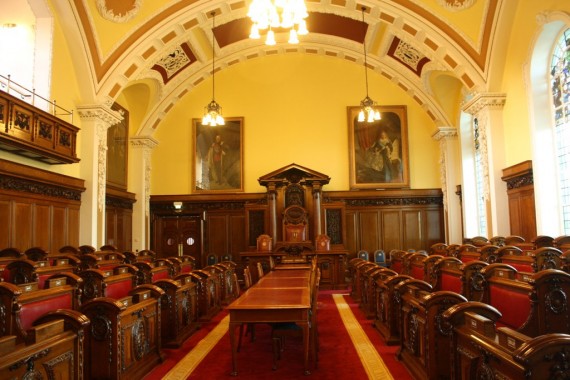
In today’s Newsletter Alex Kane argues that by not voting, he’s sending a message: “the Assembly isn’t working, the Executive is dysfunctional, we have farce rather than government, the parties don’t care.” This is a really strange argument against voting in council elections—especially since this is an election about the transformation of local government. As the Northern Ireland Local Government Association says, “On Thursday 22nd May 2014 the people of Northern Ireland will go to the polls to elect this local council in the greatest shakeup of local government in more than 40 years.” If you want change, this is not the election to boycott.
The local government reforms we are about to see will create structures designed to empower communities at the municipal level. So if, like Kane, you’re “mad as hell, and not going to take it anymore” (i.e. the inertness of the Assembly), well, this is actually the election for you. Planning powers, local economic development, urban regeneration; these powers are being devolved down to the local level. Abstain in 2016 if the Assembly is the rock in your shoe, but by all means, if you want to shape your community and drive regeneration, don’t stay home in May.
Kane’s argument against voting in upcoming elections is structured on a folk argument that I’ve heard plenty of times back in America: “don’t vote, it only encourages them.” This is the idea that by not voting, you are refusing to prop up the people and institutions that you see as failing to deliver for the electorate. “Why vote for parties who either don’t want change or are too weak and dithery to deliver change?” asks Kane.
Why vote? For one, if in the elections less than 50 percent of the electorate don’t vote, which Kane is hoping for, you are surrendering political mandate to the street. In Northern Ireland, this is a dangerous place to be in; it will call into question the legitimacy of everything from council decisions to the PSNI. Forgive me for being the blow-in who set up my life here during peace-times, but from the horror stories I’ve heard from grieving friends about the past, a “voting is not the answer” argument seems frankly reckless.
Middleclass commentators, since the start of flag protests, have simultaneously lamented loyalist disenfranchisement, and derided the re-emergence of the PUP. Back in 2012, at the beginning of the flag protests, Alex Kane argued,
They need to organise. They need to construct a socio-economic platform. They need to create an agenda. They need to engage and enthuse potential voters. They need to field their own candidates with their own manifesto. They need to stop self-appointed, self-interested spokesmen from speaking for them.
There is room for a party which is prepared to engage unionist/loyalist working classes. So instead of being manipulated by mainstream unionism or whipped up by loyalist paramilitaries the new voices of the unionist/loyalist working classes need to be focussed on earning influence and respect where it matters and then winning seats at council and Assembly level.
Now that council elections are almost here, he is telling loyalists their votes don’t matter, and that it won’t make a difference whatever happens in these elections. In fact, for working-class people at the interfaces, if voter turnout is less than 50%, they are likely to experience negative changes, including a decline in community relations that could lead to greater violence and tension—something most middle-class people can avoid simply by getting in the car and going home.
I agree with Kane that if the Assembly isn’t working, there isn’t necessarily a moral case to be made for voting, though as I’ve just argued, low voter turnout could lead to a rapid decline in political stability, affecting working-class communities the worst. Jason Brennan, political philosopher at Georgetown University, argues in The Ethics of Voting, “Institutions that hinder our ability to live well, regardless of what they symbolize or the good intentions of their creators, give us little reason to support them.”
But these elections aren’t about the Assembly. They are about councils and Europe. They are also about sending a message that we want our society’s problems solved through conversations rather than on the street—something Kane also argued for at the beginning of the flag protests.
Flag protesters are making a key error: they are now damaging the cause and brand they seek to promote. Get off the streets and into talks.
— Alex.Kane (@AlexKane221b) December 21, 2012
So why vote? I think David Swanson at Daily Kos has two really strong arguments that are applicable here in Northern Ireland.
Because there is a real value in not allowing things to get any worse than they have.
Because progress will not come from greater crisis but from greater space to maneuver in.
If you want to take hold of the reigns of your community, the elections in May are your chance. If you really can’t find someone to vote for, why not just stand yourself?
I write about faith, democracy and culture from a Christian and centre-left perspective.
Discover more from Slugger O'Toole
Subscribe to get the latest posts to your email.